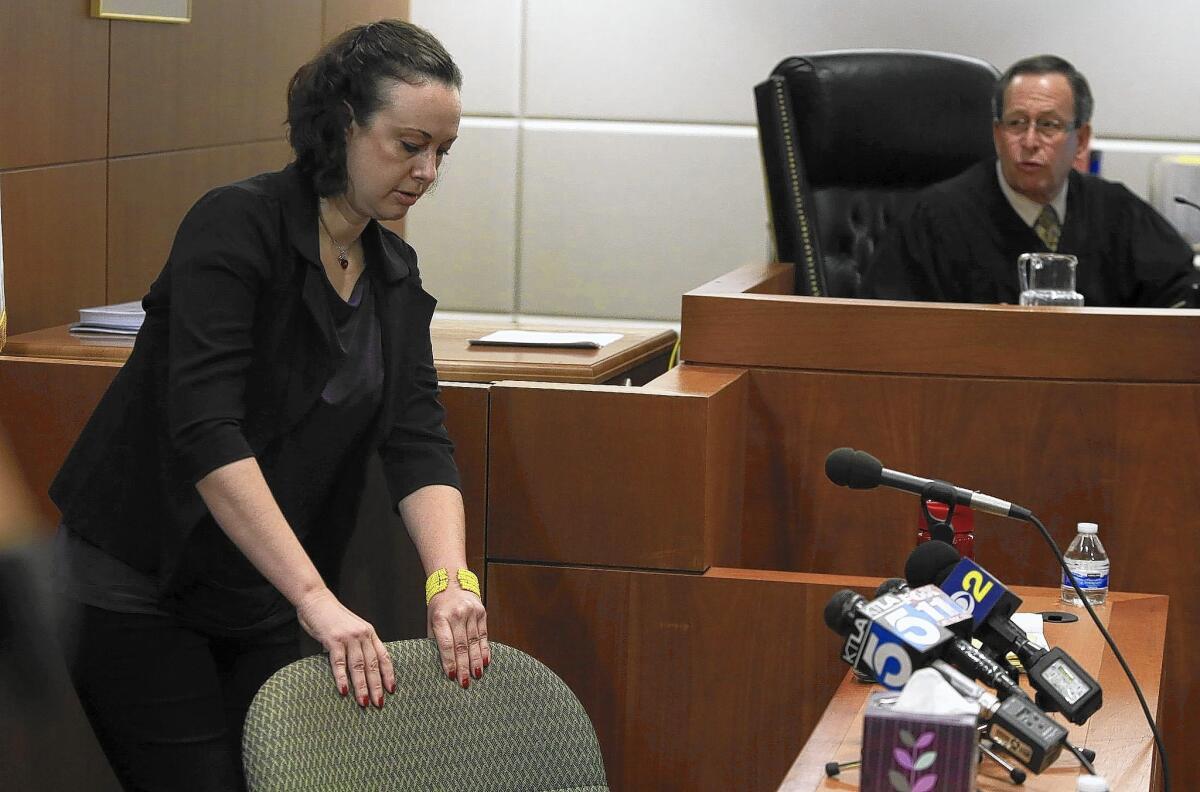For some rape survivors, ‘handle with care’ doesn’t help healing

- Share via
When Jane Piper was raped by a stranger in a Brentwood parking lot, she grabbed the corkscrew he used as a weapon and tried to fight him off. The man beat her so badly her hair was matted with blood. She managed to escape through a car window as the rapist drove off.
Police were called, an ambulance came and Piper was delivered to a hospital where rape counselors, trained to deal gently with victims, tried to comfort her.
Instead, their textbook reassurance grated on her raw nerves.
“They think because you had this horrible thing happen, they have to whisper, tiptoe around it, treat you like a child. Some people take comfort from that,” Piper acknowledged. “I didn’t need it. I felt patronized.
“The whole mentality back then was ‘Don’t worry, you don’t have to tell anyone.’”
Back then was 2003, but not much has changed since. Protecting the privacy of rape survivors is still considered a priority — a way to shield vulnerable women from painful scrutiny.
But Piper didn’t want secrecy. And she didn’t need absolution. “They must have said to me 15 times, ‘You have nothing to be ashamed of. You didn’t do anything wrong.’ I wanted to say to them, ‘You don’t have to tell me that.’
“The whole shame thing always drives me crazy,” Piper said. “I was raped in a parking lot in broad daylight. What would I have to be ashamed about?”
::
The shame thing has always shrouded sexual assaults, hobbling recovery for survivors and complicating our response. Studies show that more than half of all rape victims never report their attacks; they feel guilty, embarrassed, afraid, worried about what people might think.
Piper is part of a small but growing cadre of survivors who insist on going public.
She made her stand on Tuesday, when she challenged her rapist in court, after he pleaded guilty and before he was sentenced to 20 years in prison.
She wanted to know why he did it. He claimed not to remember. Still, the meeting — before news reporters and TV cameras — seemed to somehow lighten the weight of a burden she’d carried for 11 years.
I chatted with Piper on Thursday at a Studio City coffee shop. She’s being hailed as courageous, but doesn’t want to be seen as a rape-victim poster child.
“Everyone deals with it differently,” Piper said.
She pushed herself to go public from the start.
She enlisted her boyfriend to tell all their friends. She shared her story at a fundraiser for a rape treatment program one month after the attack. She even worked a bit on the rape into her stand-up comedy act. She chronicled her case on her Facebook page, until her lawyer told her to stop.
Piper is a hero to women such as Karen Pomer, who helped launch the Rainbow Sisters Project to support survivors after she was raped by a stranger in Santa Monica 19 years ago.
Pomer said research suggests that speaking out helps a survivor recover. She knows from experience how hard it is to go public. Recalling the questions she was asked after her assault still makes her cringe:
What were you wearing? Why were you out so late? How on Earth could your boyfriend stay with you?
::
Piper doesn’t remember insulting questions, just awkward silence. “I was open about making sure everyone knew, but very few people even mentioned it to me,” she recalled.
“I didn’t want people to hold my hand and carry me around … I just wanted it acknowledged that I’d been through something rough.”
With counseling, she said, she held things together pretty well for a while. “I was always pretending everything was fine. But it takes a lot of energy to be OK when you’re not OK at all.”
Four years after the rape, her life had fallen apart. She’d split from her boyfriend, run off her friends and given up on an acting career that had been on the ascent. A friend invited her to move to Vancouver, so she took off.
Piper was barely settled in when an LAPD detective called. “I’d finally got out, left all that behind. And then they found the guy who raped me through a DNA match.”
She had to pick him out of a lineup and testify at his preliminary hearing. She burst into tears on the witness stand, as his attorney tried to minimize the violence of the attack.
When the prosecutor offered her a chance to speak at this week’s sentencing hearing, she put a lot of care into crafting her speech. She wanted him to understand her pain, her losses, her grief.
She’d spent years being angry at the world: The man parked next to her in the grocery store lot, who got in his car and pulled away while she was being assaulted. The ambulance drivers who nonchalantly joked about their favorite “Survivor” episode as they loaded her, shellshocked, in their van. The friends who grew weary of her wild and volatile moods.
She understands that there is no one right way to heal. The last thing a woman who has been raped needs is someone telling her how she should feel and what to do with those feelings.
“There are people who want to crawl into a closet, never want to talk about it, just pretend it never happened,” she said. “Some of us deal better by shoving it in the back of our psyche. They have every right to stay completely private.
“But that wasn’t right for me.... And as long as that’s the norm, we will never be able to talk about rape openly.”
sandy.banks@latimes.com
Twitter: @SandyBanksLAT
More to Read
Sign up for Essential California
The most important California stories and recommendations in your inbox every morning.
You may occasionally receive promotional content from the Los Angeles Times.














